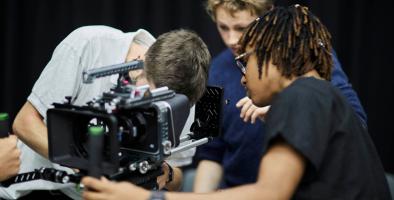BA (Hons)
Promotional Media: PR, Advertising and Branding
This programme will give you a theoretical and practical insight into today's media landscape, driven by the growing industries of advertising, branding, and PR.
Content navigation menu
Why study BA Promotional Media: PR, Advertising and Branding at Goldsmiths
- Rated 11th in the world by the QS World University Rankings by Subject (2023), you'll study in one of the top media, communications and cultural studies departments in the world.
- You’ll explore the relationship between new technology, consumer culture and promotional practices in a changing media landscape.
- You’ll discover how different media such as art and video relate to promotional media, and examine the development of promotional media in both historical and contemporary contexts.
- This degree is interdisciplinary, and you'll evaluate the impact of promotional activity culturally, sociologically economically and politically.
- Thanks to our strong links with industry, you'll have the opportunity to complete a work placement and develop skills to help with your future career.
- You’ll balance theoretical learning with practical skills through the production of creative work.
- You’ll learn in small groups from industry experts in media, communications, brand, advertising and more. Our series of talks and debates from world-renowned guest lectures will enrich your academic experience.
- You’ll benefit from studying in one of the world’s greatest centres for media – London – and have the chance to visit media organisations to further your knowledge.
- Inclusivity and engagement are guiding principles within the Department and we aim to take our students' lived experience into account. We’ve strived to decolonise our teaching both intellectually and culturally.
Contact the department
If you have specific questions about the degree, contact Alison Winch.
UCAS code
P310
Entry requirements
A-level: BBB
BTEC: DDM
IB: 33 points overall with Three HL subjects at 655
Length
3 years full-time
Fees
Home - full-time: £9250
International - full-time: £20840
Department
What you'll study
In your first year, you will produce a written portfolio, design your own website and become versed in promotional media and marketing theory.
Compulsory modules
You'll complete the following compulsory modules:
| Module title | Credits |
|---|---|
| Introduction to Promotional Media: Histories, Contexts, Theories | 15 credits |
| Introduction to Marketing | 15 credits |
| Writing For The Media | 30 credits |
| Media Arts | 15 credits |
| Culture and Cultural Studies | 15 credits |
| Web Design | 30 credits |
Note about optional modules (if available): The above is indicative of the typical modules offered, but is not intended to be construed or relied on as a definitive list of what might be available in any given year. The module content and availability is subject to change.
Teaching style
This programme is taught through scheduled learning – for example, through a mixture of lectures, seminars and workshops. You’ll also be expected to undertake a significant amount of independent study. This includes carrying out required and additional reading, preparing topics for discussion, and producing essays or project work.
Assessments and credits
How you’ll be assessed
You’ll be assessed by a variety of methods, depending on your module choices. These may include coursework assignments such as extended essays, reports, presentations, practice-based projects or essays/logs, group projects and reflective essays.
Credits and levels of learning
An undergraduate honours degree is made up of 360 credits – 120 at Level 4, 120 at Level 5 and 120 at Level 6. If you are a full-time student, you will usually take Level 4 modules in the first year, Level 5 in the second, and Level 6 modules in your final year. A standard module is worth 30 credits. Some programmes also contain 15-credit half modules or can be made up of higher-value parts, such as a dissertation or a Major Project.
Entry requirements
We accept the following qualifications:
A-level: BBB
BTEC: DDM
International Baccalaureate: 33 points overall with Three HL subjects at 655
Access: 60 credits overall with 30 distinctions and distinctions/merits in a related subject
Scottish qualifications: BBBBC (Higher) or BBC (Advanced Higher)
European Baccalaureate: 75%
Irish Leaving Certificate: H2 H2 H2 H2
If you can't find your qualification here, then please visit our entry requirements page for a list of alternative qualifications.
Alternative qualifications and experience
See our full list of undergraduate entry qualifications.
We welcome students with a range of educational experiences. If you believe you may not meet the standard qualification requirements we would still encourage you to apply because we consider all aspects of your application when making a decision.
We’ll pay particularly careful attention to your personal statement, which is your opportunity to demonstrate your interest in the subject you’ve applied for. Your referees are also welcome to include any relevant contextual comments around your academic achievements. We’ll look at all these things when making a decision on your application, as well as your qualifications and grades.
International qualifications
We also accept a wide range of international qualifications. Find out more about the qualifications we accept from around the world.
If English isn’t your first language, you will need an IELTS score (or equivalent English language qualification) of 6.0 with a 6.0 in writing and no element lower than 5.5 to study this programme. If you need assistance with your English language, we offer a range of courses that can help prepare you for degree-level study.
Fees and funding
Annual tuition fees
These are the UG fees for students starting their programme in the 2024/2025 academic year.
From August 2021 EU/EEA/Swiss nationals will no longer be eligible for 'Home' fee status. EU/EEA/Swiss nationals will be classified as 'International' for fee purposes, more information can be found on our fees page.
- Home - full-time: £9250
- International - full-time: £20840
If your fees are not listed here, please check our undergraduate fees guidance or contact the Fees Office, who can also advise you about how to pay your fees.
It’s not currently possible for international students to study part-time if you require a Student Visa, however this is currently being reviewed and will be confirmed in the new year. Please read our visa guidance in the interim for more information. If you think you might be eligible to study part-time while being on another visa type, please contact our Admissions Team for more information.
If you are looking to pay your fees please see our guide to making a payment.
Funding opportunities
We offer a wide range of scholarships and bursaries, and our career service can also offer advice on finding work during your studies. Find out more about funding your studies with us.
To find out more about your fees, please check our undergraduate fees guidance or contact the Fees Office, who can also advise you about how to pay your fees.
Additional costs
In addition to your tuition fees, you'll be responsible for any additional costs associated with your course, such as buying stationery and paying for photocopying. You can find out more about what you need to budget for on our study costs page.
There may also be specific additional costs associated with your programme. This can include things like paying for field trips or specialist materials for your assignments. Please check the programme specification for more information.



